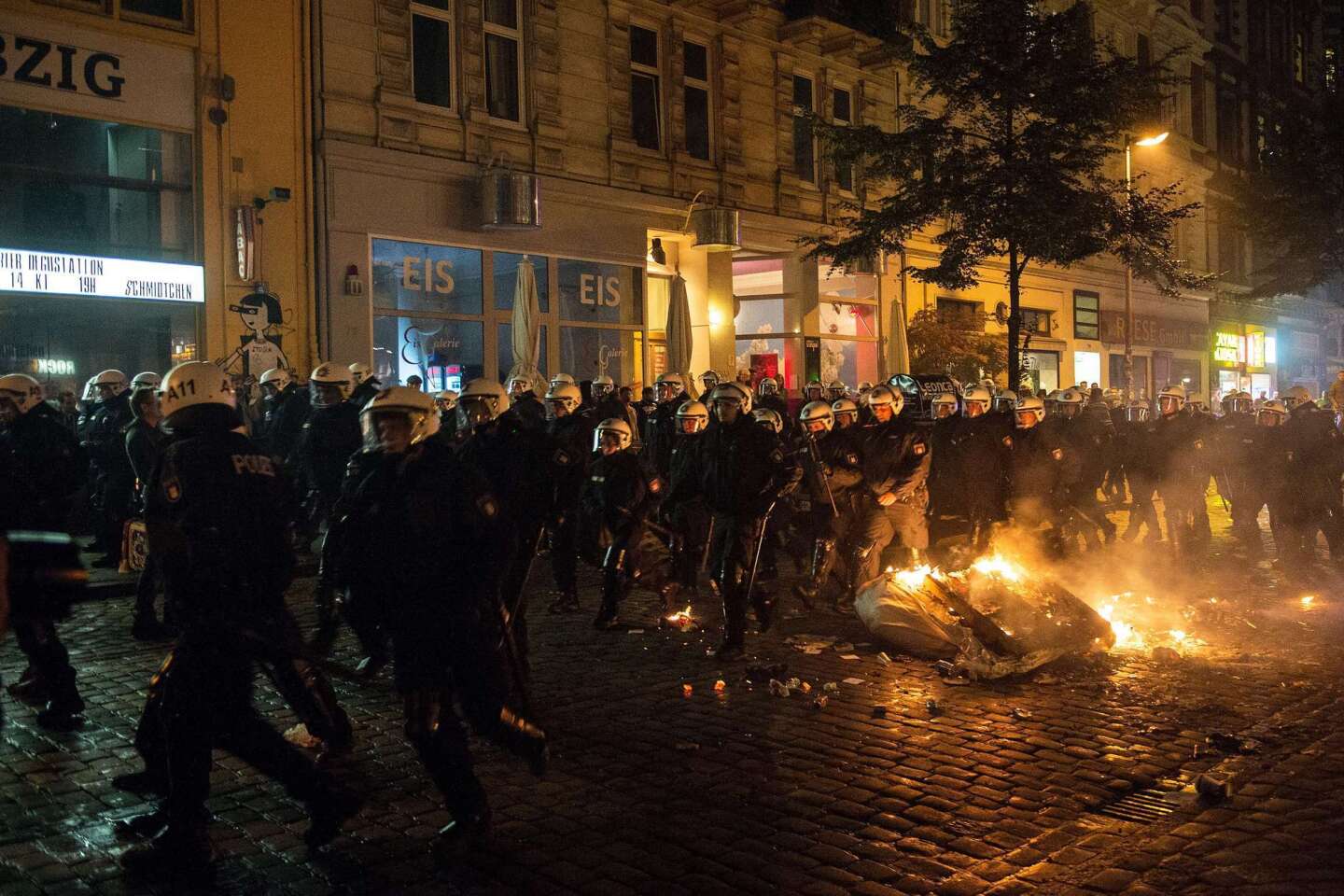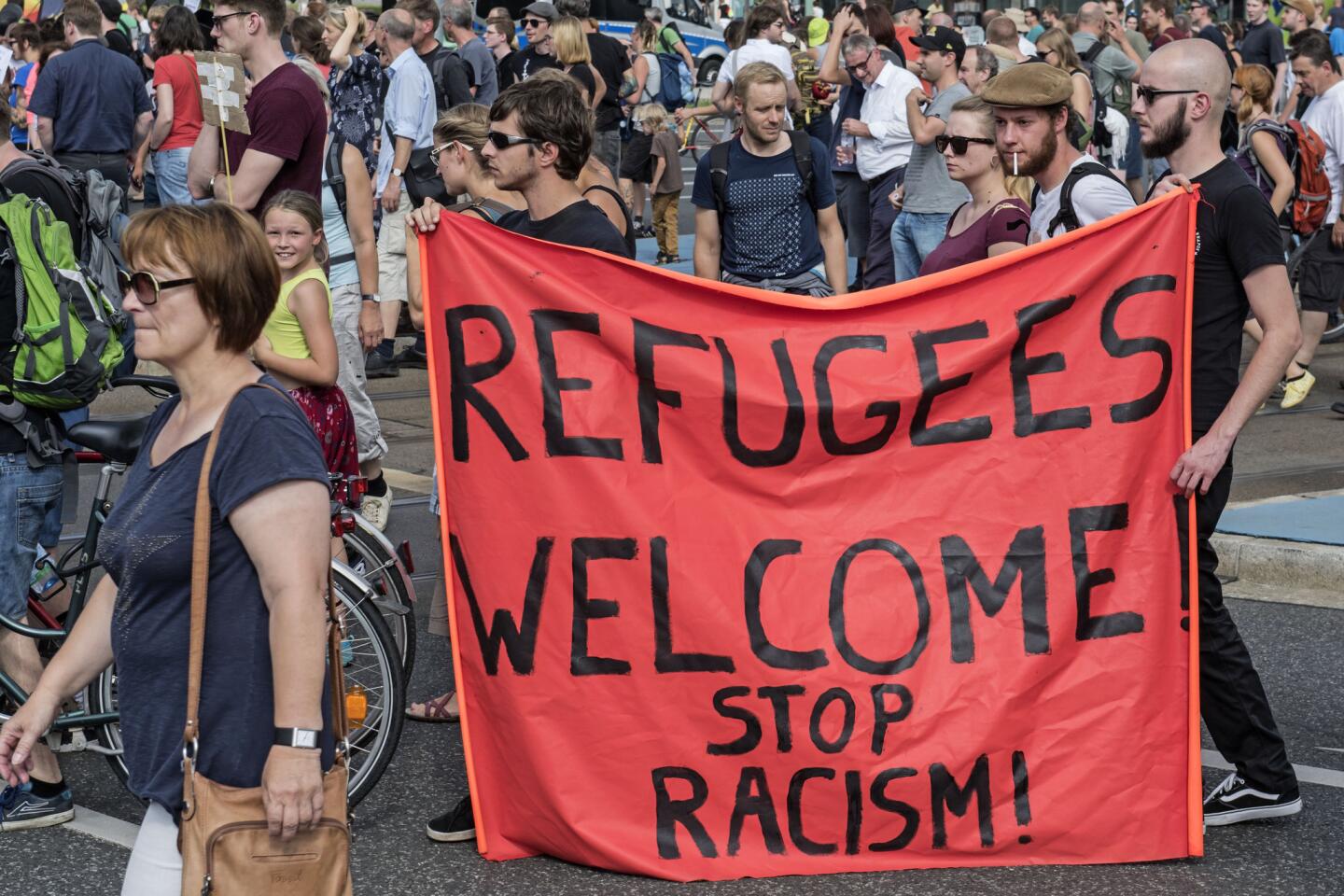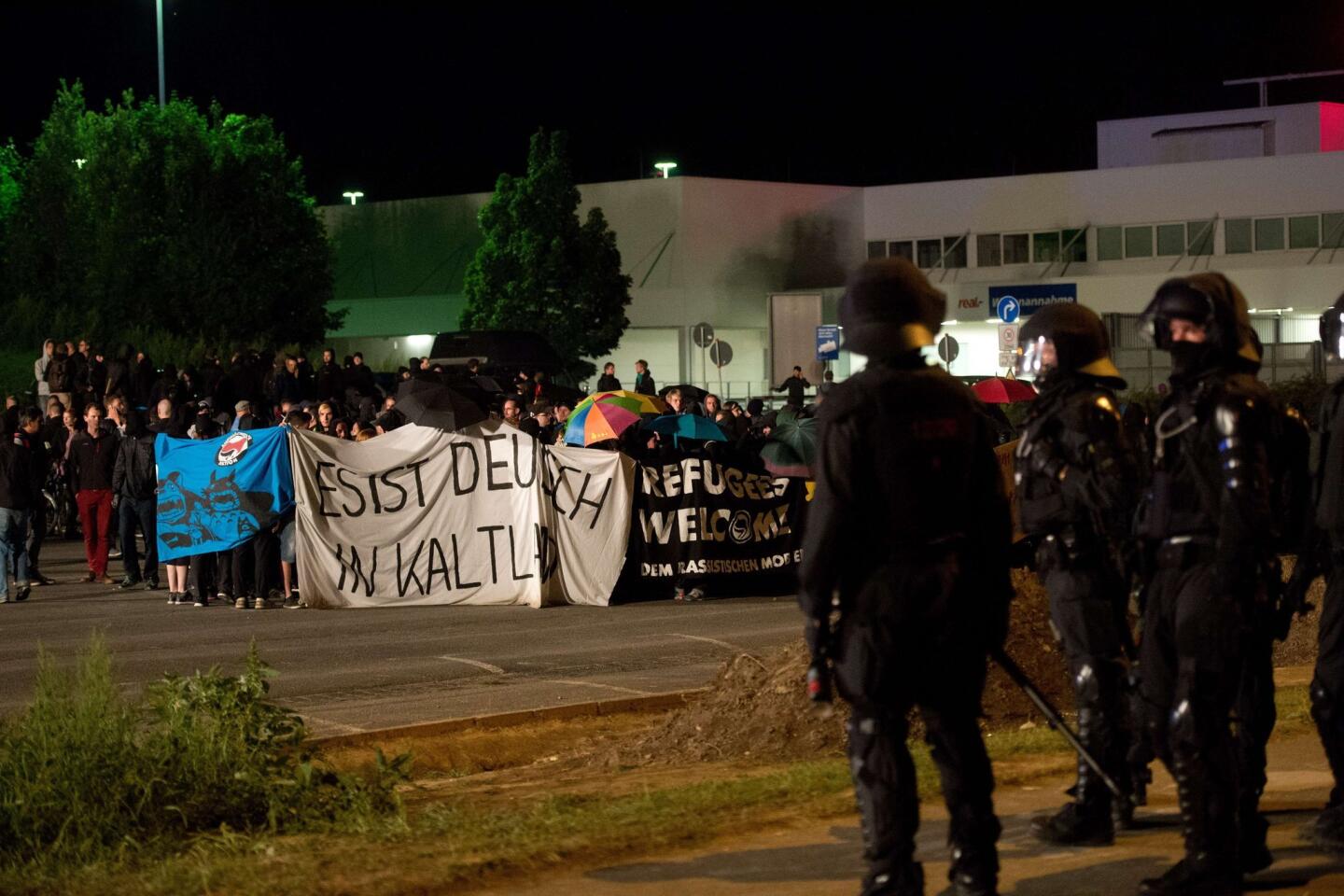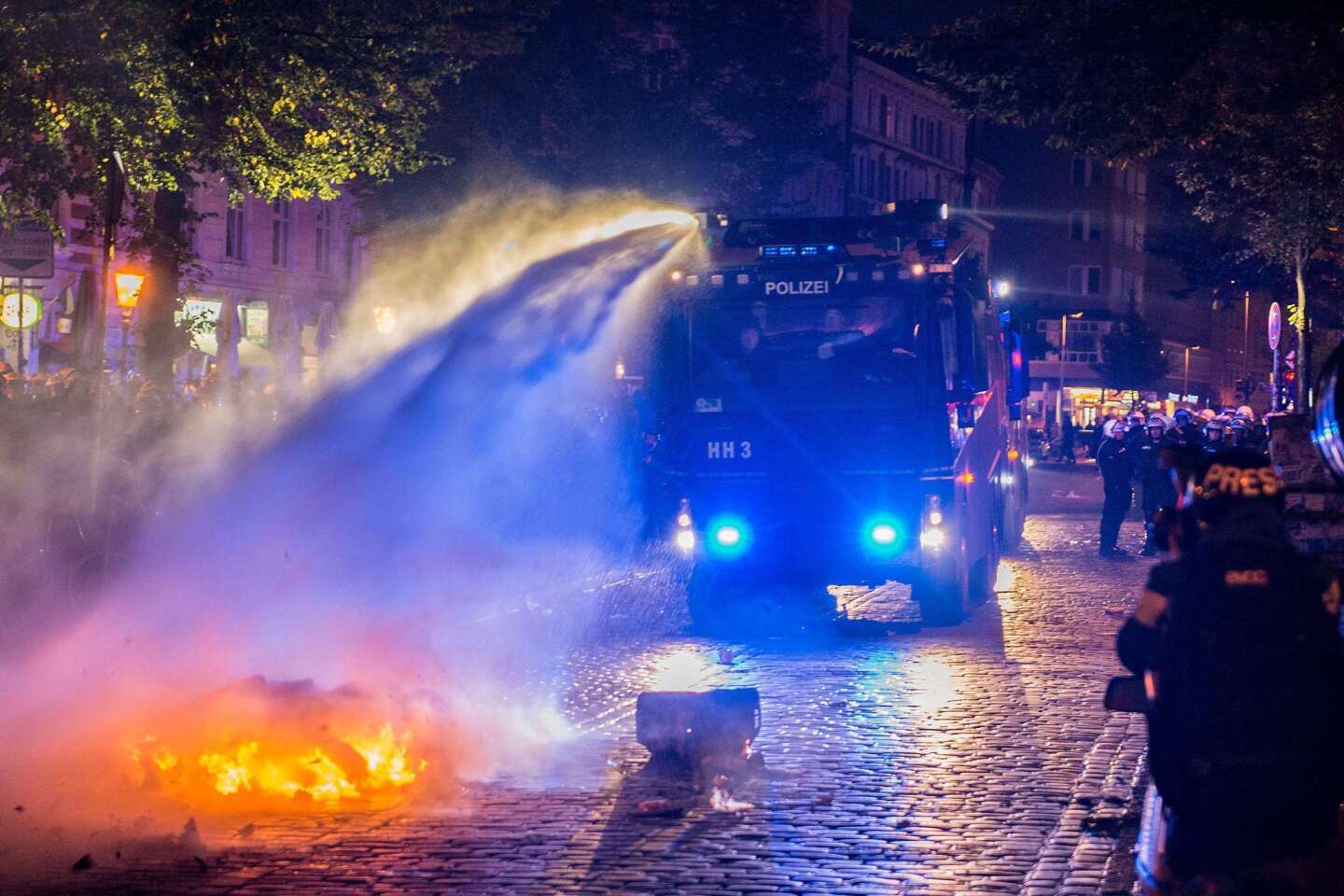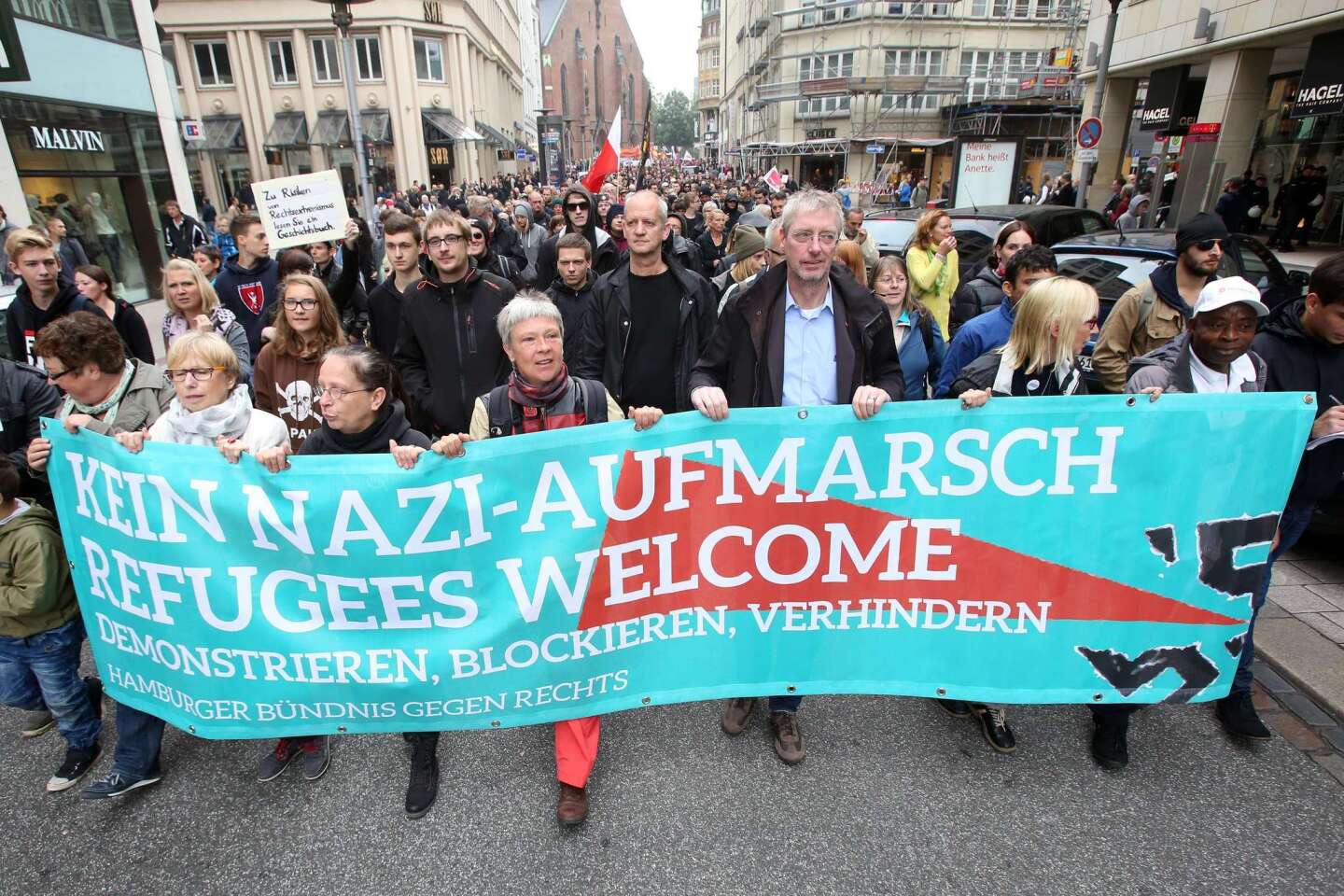Migrant crisis playing into the hands of Germany’s extremists
- Share via
Reporting from Dresden, Germany — When anti-immigrant chants echo off the splendid, ornate buildings of this bustling city on the River Elbe, Dresden’s residents are, for the most part, mortified.
Many here insist that flamboyant outbursts of fury directed at the wave of migrants and refugees reaching Europe’s shores this year are not the true face of Dresden, or the former East Germany — or of Germany as a whole.
“There’s a fear of the unknown, and it sometimes finds an ugly expression,” said office worker Heike Ullrich, enjoying a sunny morning with her husband and two flaxen-haired toddlers in a market square in the city center. “On the whole, people here are welcoming of outsiders.”
Perhaps best known for the Allied firebombings of 1945 that killed tens of thousands of people and laid waste to the jewel-box Baroque architecture of its Old Town, since painstakingly reconstructed, Dresden has long carried an unwelcome taint as a center of Germany’s small but virulent neo-Nazi movement.
Some analysts worry that the arrival of hundreds of thousands of refugees on Europe’s shores — the largest share of them Muslims fleeing war and violence in Syria, Afghanistan and Iraq — could breathe new life into far-right movements, not only in the former East Germany but also elsewhere in Europe, particularly on its less prosperous eastern fringes.
That dynamic has been playing itself out in the Balkans and other economically disadvantaged countries of the former Soviet bloc, which have been preoccupied in recent weeks with preventing asylum seekers passing through from trying to gain a longer-term foothold there. It is an ironic scenario, given that virtually none of the refugees wants to stay.
“In a way, it’s a perfect storm,” said Alina Polyakova, associate director of the Atlantic Council’s Eurasia Center, who studies European extremist movements. Large numbers of arriving asylum seekers, she said, provide far-right groups with a rallying cry, lending a volatile new energy to longtime rhetoric centering on the purported threat to the national character posed by new arrivals, particularly from Muslim countries.
The number of migrants and refugees — up to 1 million projected to be received this year by Germany, which is the ultimate destination of many asylum seekers — can serve to broaden the appeal of extremist groups to those who might feel the country’s resources are being strained beyond limit, Polyakova said.
On Sunday, the head of Germany’s domestic intelligence sounded a warning that the summer’s huge influx could further radicalize the country’s fringe movements.
“What we’re seeing in connection with the refugee crisis is a mobilization on the street of right-wing extremists, but also of some left-wing extremists,” said the spy chief, Hans-Georg Maassen, speaking on German public radio. A day earlier, street clashes broke out in the eastern city of Leipzig after hundreds of rightists staged an anti-immigrant rally and migrants’ supporters held a counterprotest.
Despite Germany’s long and continued efforts to live down its dark history, with its Nazi notions of racial superiority and national purity, the migrant crisis plays into the hands of those seeking to reap political gain from xenophobia. Dresden, the third-largest city in the former East Germany, last month was the scene of a rally by the anti-Islam group Pegida, which drew about 5,000 people, the largest such turnout in the city in months.
The movement, which garnered 10% of the vote in its first ballot-box venture, Dresden’s mayoral election in June, says it intends to field candidates in local, state and federal elections.
Germany has a precisely calibrated system of dispersal of refugees and migrants across the country, based on population and other factors. Because of that, the former East Germany — hardly a dream destination for arrivals whose sights might be set on tolerant, freewheeling Berlin or financial dynamo Frankfurt — will be obliged to absorb its share.
Chancellor Angela Merkel, whose government has largely embraced the new arrivals, has seen her public support slip in a series of polls in recent weeks, with the refugee crisis pinpointed as the cause. The latest of those surveys, conducted this week for ARD television, suggested that satisfaction with Merkel had fallen by 9 percentage points over the course of a month, while a prominent critic of her refugee policies enjoyed a similar-sized bounce.
Merkel has for months employed unusually passionate language to denounce far-right tropes carrying an implicit or explicit message of ethnic and racial hatred.
In a nationally televised New Year’s address, she implored compatriots to not attend rallies with an anti-immigration theme. Citing Pegida demonstrations at which the slogan “We are the people” was chanted, Merkel accused far-right movements of misappropriating a phrase used a generation ago by protesters seeking to topple the Berlin Wall.
“What they really mean is: You are not one of us, because of your skin color or your religion,” said the chancellor, a native of Germany’s east.
Firebomb attacks on facilities hosting refugees and migrants have taken place in many corners of Germany. But the eastern part of the country, with only 20% of the population, has had a disproportionate share of such attacks.
Last month, police in the eastern town of Niederau were forced to escort arriving migrants’ buses after anti-immigrant groups menaced them at their designated shelter. Earlier in the month, right-wing protesters in the town of Bischofswerda, east of Dresden, tried to block the road to another shelter for asylum seekers. And in Heidenau, south of Dresden, more than 100 suspected extremists attacked a refugee facility.
Even so, officials in Dresden say the city and its environs should not be held up as an emblem of opposition to newcomers.
“It’s not a special problem here,” said Kai Schulz, a spokesman for the mayor’s office. “The western part [of Germany] looks to the eastern part and says, ‘Oh, they’re so difficult.’ We have problems with racism, yes, but there are these same problems everywhere.”
Still, there are occasional outbursts of aggression and anger from locals, even from those meant to be protecting migrants and refugees.
On Dresden’s industrial outskirts, no guards were at the gate on a recent morning when a pair of journalists visited a Red Cross-run refugee camp and spoke to a number of Syrians hoping to win asylum in Germany.
Most of the arrivals, who are allowed to leave the camp and go into town, said they had not sensed any significant degree of hostility from residents, although young Kurdish men from Syria described a tense encounter with a group of men who blocked their path outside the camp and made obscene gestures at them.
“They were drunk, and we just ignored them,” said one of the Kurds, an engineering student. He said church groups had repeatedly visited the camp, bringing donations of clothing and other necessities. “I think most people here are kind and well-intentioned.”
On departing the camp, reporters were surrounded and confronted by locally hired security guards contracted by the Red Cross, who threatened them with arrest, searched bags, deleted cellphone pictures and tore out pages from notebooks.
“How did you get in here?” demanded one heavily tattooed guard, who also pointedly questioned the immigration status of an Arabic-language interpreter.
Another, with henna-red hair and an outsized nose ring, declared, “We’re from here. Where are you from?”
The Geneva-based International Committee of the Red Cross referred questions about the security guards’ behavior to the German Red Cross, which did not provide any comment.
Schulz, the mayoral spokesman, said the key question was whether Germany’s central government would provide long-term help to states such as Saxony, of which Dresden is the capital, in coping with the influx. The city is housing about 5,000 migrants and refugees.
“It’s a very big job, because no city in Germany has enough places for all these people, right away,” he said. “We can get them temporary places, but we have to get them into real flats where they can live, begin a new life.... The important matter is that we can take all these refugees and give them a place to be.”
Twitter: @laurakingLAT
More to Read
Sign up for Essential California
The most important California stories and recommendations in your inbox every morning.
You may occasionally receive promotional content from the Los Angeles Times.
